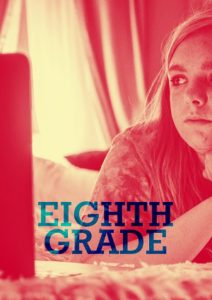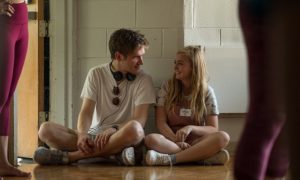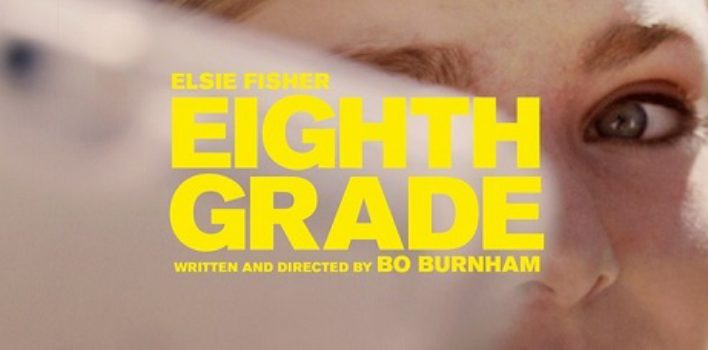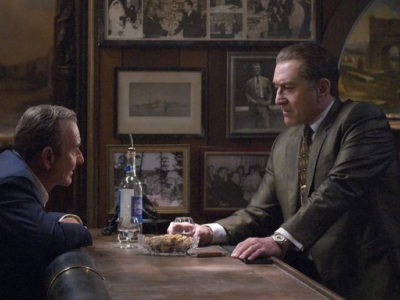Review| Eighth Grade
 Watching Eighth Grade is an experience. Kayla (played brilliantly by newcomer Elsie Fisher) is trying to figure out who she is as she makes the transition from eighth grade to high school. It is affecting, insightful, and relatable and as I sat in my theater seat taking in all of the sights and sounds of a spectacular film, I also found myself digesting what the director, 27 year-old Bo Burnham, has to say about the human experience. He explores the role of technology in our everyday lives, the process of reconciling who we are with who we want to be, and ultimately what we do to matter.
Watching Eighth Grade is an experience. Kayla (played brilliantly by newcomer Elsie Fisher) is trying to figure out who she is as she makes the transition from eighth grade to high school. It is affecting, insightful, and relatable and as I sat in my theater seat taking in all of the sights and sounds of a spectacular film, I also found myself digesting what the director, 27 year-old Bo Burnham, has to say about the human experience. He explores the role of technology in our everyday lives, the process of reconciling who we are with who we want to be, and ultimately what we do to matter.
I know I’m not the only one who was intrigued by the idea of a 27-year-old guy trying to navigate a coming-of-age story about an awkward 14-year-old girl. But in hearing from Bo Burnham at the advanced screening and Q&A it actually makes a lot of sense. Burnham is telling a story about a struggle that impacts many of us: having anxiety in a world that is constantly giving us feedback. Despite his early fame as a musician and comedian on YouTube, Burnham has openly admitted that he struggles with anxiety in the face of performing and wrestles with permeating social issues like how the internet is impacting the way humans interact with one another. He even explores these topics in his stand-up. In revisiting some of his stand-up material on Netflix, I was surprised to see his outlook on these topics actively evolving, even as it was punctuated by moments of crass humor.
 So what is about Burnham’s perspective reflected in 15-year-old Kayla’s story that we can relate to? As she meanders the halls in her last week of middle school, struggles to make conversation with the “cool kids,” and pines after the boy of her dreams (from a safe distance), what is it about the way Burnham handles this story that strikes a chord with audiences? In many ways it is simple – anyone who remembers the dreaded time between middle school and high school will understand. In other ways it is complex – exploring the various ways we work hard in every stage of life to make our existence count, especially in our current age where there are so many voices and opinions about who we should be and why. The film has received critical and audience acclaim because it accomplishes both.
So what is about Burnham’s perspective reflected in 15-year-old Kayla’s story that we can relate to? As she meanders the halls in her last week of middle school, struggles to make conversation with the “cool kids,” and pines after the boy of her dreams (from a safe distance), what is it about the way Burnham handles this story that strikes a chord with audiences? In many ways it is simple – anyone who remembers the dreaded time between middle school and high school will understand. In other ways it is complex – exploring the various ways we work hard in every stage of life to make our existence count, especially in our current age where there are so many voices and opinions about who we should be and why. The film has received critical and audience acclaim because it accomplishes both.
The main themes of the film are conveyed through Kayla’s YouTube channel where she regularly records herself giving advice to her peers on topics like “being yourself” and “having confidence.” We’re thrust into the two worlds that Kayla inhabits – her fictional, YouTube channel world where she gets to portray who she wishes she was, and the real world where she doesn’t have any friends, eats lunch alone, and is named “Most Quiet” at the end-of-year superlative assembly. The moments in between are filled with a constant scrolling through social media feeds as Kayla embodies the stereotypical 15-year-old in 2018. These platforms inform Kayla’s behavior and determine who she thinks she should be. It’s cringe-worthy, but ultimately reveals that the desire to gain the approval of the people who matter to us is evergreen, even if it’s in a different social context from generations past. Burnham himself confesses that his main goal is not to offer a criticism of the way social media bears its weight on the youth of today, but more to bring them up as a point of discussion.
 Kayla is in that sweet spot of adolescence when her peers’ opinion means everything to her. Her dad, a single parent, offers up his opinion of her, but she makes it very clear that the fact that he thinks “she is so cool” means nothing to her. Or at least not on the surface. In one of the most beautiful moments of the film, Kayla and her dad are sitting around a campfire and she asks him if she’s a disappointment to him just because of who she is. His answer is overwhelmingly affirming as he shares with her what an honor it is to be her dad. Her response of crawling up in his lap and giving him a big hug shows us that Kayla might not be as ambivalent about his opinion of her as we may think. This scene and Kayla’s reassurance at the end of the film gives us hope that just because things are hard now, doesn’t mean they will always be this way.
Kayla is in that sweet spot of adolescence when her peers’ opinion means everything to her. Her dad, a single parent, offers up his opinion of her, but she makes it very clear that the fact that he thinks “she is so cool” means nothing to her. Or at least not on the surface. In one of the most beautiful moments of the film, Kayla and her dad are sitting around a campfire and she asks him if she’s a disappointment to him just because of who she is. His answer is overwhelmingly affirming as he shares with her what an honor it is to be her dad. Her response of crawling up in his lap and giving him a big hug shows us that Kayla might not be as ambivalent about his opinion of her as we may think. This scene and Kayla’s reassurance at the end of the film gives us hope that just because things are hard now, doesn’t mean they will always be this way.
While the intensity of feeling exposed and immaturity of eighth grade is temporary, Burnham has given us something really special in the simplicity of remembering, or wincing rather, at a time at the height of puberty when we first start developing an awareness of how we are perceived by others, while also giving us an opportunity to reflect on the unending desire to be someone who matters.







